“Your Body Suffers”: The Unremarkable Pain of an Auto-Assembly-Line Worker
Vehicle-manufacturing jobs grind down workers’ bodies. Is it time for a 32-hour week?
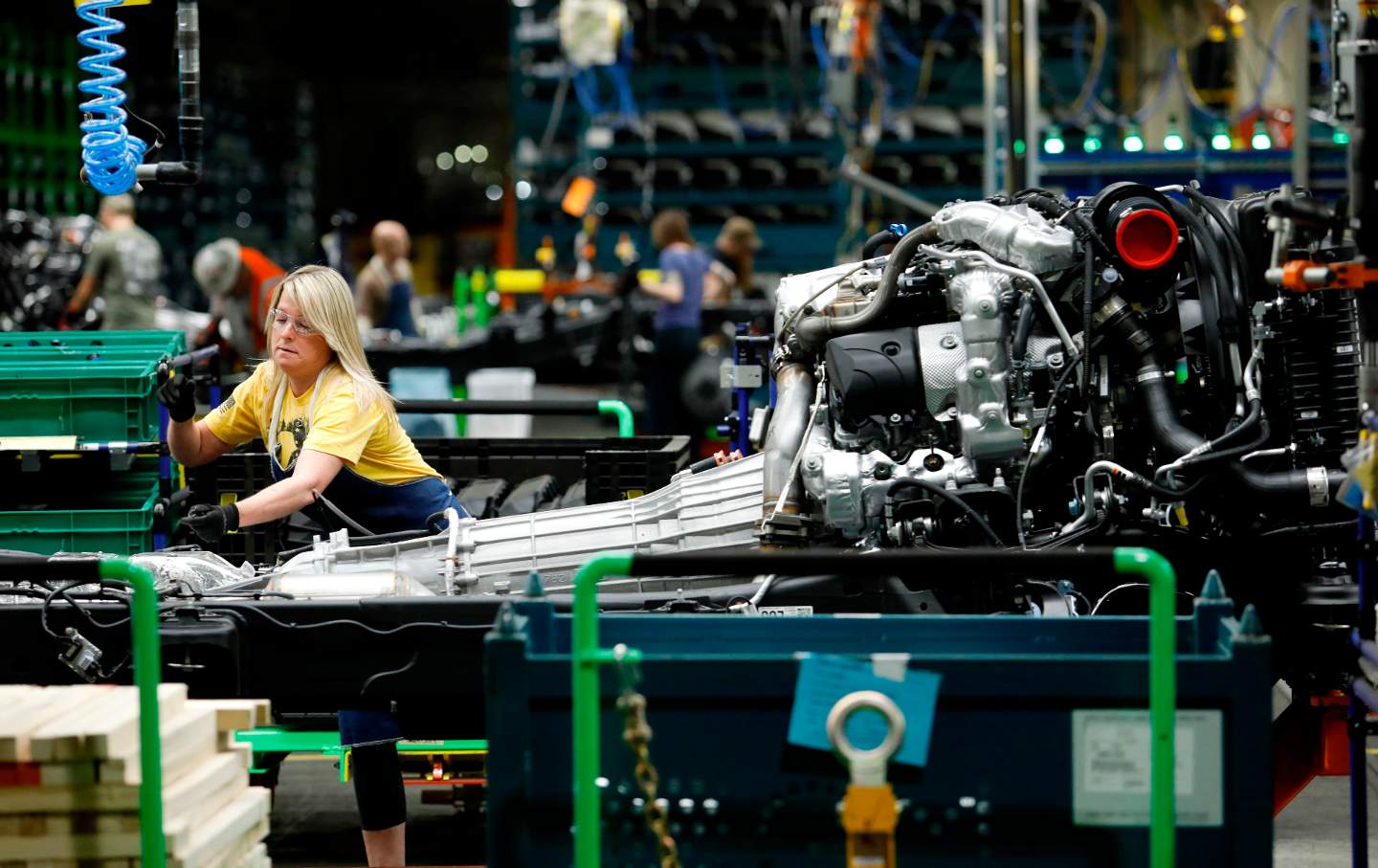
Line workers work on the chassis of full-size General Motors pickup trucks at the Flint Assembly plant on June 12, 2019, in Flint, Mich.
(Jeff Kowalsky / AFP / Getty Images)Daniel Carpenter was one month past his 40th birthday when he suffered neck pain so severe that he thought he was having a stroke. “I was up north with my girlfriend at the time at a wedding,” said the autoworker, who has been employed for nearly 19 years at General Motors, almost all of it at the company’s Detroit-Hamtramck Assembly Center in Michigan, which produces the Hummer and Silverado. “We were staying at a cabin. I couldn’t walk. I couldn’t move.”
There was no single catastrophic incident that led to what he believes is a workplace injury, but rather, a series of small, unremarkable incidents, performed over and over, what he described as “constantly moving, fixing things, bending. It comes back to the repetition of the job. It’s nonstop. There’s no other way to explain it.”
The pain, which struck the summer before Covid, was so excruciating he could not sleep for three days, he recalled. Relatively young, he had been physically active, with a passion for long-distance running, but soon had to undergo a surgery known as an anterior cervical discectomy. “They put a titanium plate in the back of my neck,” he said.
A member of United Auto Workers (UAW) Local 22, Carpenter is one of around 150,000 workers affected by their union’s “stand-up strike” against the Big Three automakers—Ford, General Motors, and Stellantis. Knowing that his location may be called on to walk out in a series of expanding strikes, he said the pain he has endured is a key working condition that must be addressed, not only for himself but for his coworkers too. “When workers say they’re in pain, I always say they’re telling the truth, because I felt that pain for many years. I still do.”
As autoworkers make demands for improved pay, the elimination of tiers, ending the abuse of temporary workers, more paid time off, and cost-of-living adjustments, companies have sought to portray them as overreaching. “The fundamental reality is that the UAW’s demands can be described in one word—untenable,” wrote General Motors President Mark Reuss in a recent op-ed in the Detroit Free Press.
But unlike the presidents and CEOs of the Big Three, the workers who manufacture and distribute vehicles and parts work jobs that grind down their bodies over the course of years. Many sacrifice their lower backs, rotator cuffs, hands, wrists, or just the pleasure of waking up without pain. Two separate polls found that the US public is overwhelmingly on the side of striking UAW members against the bosses. Even still, workers say there is a gap in public awareness about the pain and injury that comes with repetitive work performed over long hours.
“People don’t really get it,” said Carpenter, “but we definitely earn our pay.”
Thomas Armstrong, a professor of industrial and operations engineering at the University of Michigan–Ann Arbor, said musculoskeletal injuries are “inherent” to this kind of work. “Working on a car, working on something that is big, you have spaces that are hard to reach. You end up with a combination of postural problems and stressors, if those are repeated regularly.”
Pinning down the exact prevalence of these injuries is difficult. Musculoskeletal disorders refer to a range of issues, Armstrong explained, from aches and pains to nerve and tendon problems, and lack the conspicuousness of other injuries, like amputations. “A lot of people don’t report these problems,” said Armstrong, sometimes out of fear of retaliation. “These aren’t the problems people die from.” But while musculoskeletal disorders may lack the shock effect of more immediate, gruesome workplace injuries, they erode quality of life, both at work and outside of it, and can be harbingers of serious and long-lasting problems, Armstrong said.
Union workplaces have more protections against workplace injuries than their non-union counterparts, a UAW source said, but some contractually protected programs have suffered from concessions, just as wages and other provisions have. The Big Three used to have full-time ergonomic representatives who were appointed by the union and paid by the company, the source explained.
But, the source said, some time after 2006, oversight of ergonomics was assigned to workers with other responsibilities, like industrial hygiene technicians who sample the air for chemicals. Now, there are no longer full-time positions solely dedicated to ergonomics, which the union source said has reduced the responses to injuries and complaints.
According to Armstrong, ergonomics have improved in the industry “since 1976 when we started these studies,” thanks to factors like changes in tooling, workplace layout, and mechanical assistance. But, he said, “that doesn’t mean there still aren’t stressors. It takes a lot of physical activity to assemble a car.”
Dawnya Ferdinandsen, 54, is an assembly-line worker at the Toledo, Ohio, General Motors propulsion plant, which makes transmissions. She said the only way she knows how to describe repetitive motion is by suggesting a challenge: “Take all your clothes, put them in a basket, pick up the basket, take them to the wash area, put the basket down, lift the lid, put in detergent, bend down, put them in the washer, shut the lid,” she said. “Then reach into the washer and pull the clothes back out, stand back up, bend back down, put them in the basket, carry them to the dryer, put them in. Repeat that for half an hour nonstop.”
Popular
“swipe left below to view more authors”Swipe →“If you do that for half an hour with no break,” she said, “then tell me how you’d like to do that for 12 hours, six or seven days a week, week after week, month after month, year after year after year. And as you’re doing it year after year, you’re getting a year older. The body can only do that for so long, then you get back problems, wrist problems, hip problems. We have all that.”
Carpenter said he believes that the job that caused him the greatest injury was one he performed at the Detroit-Hamtramck plant in his 20s for about five years: installing brake pedals. He said the easiest way ergonomically to perform the job was to climb into the vehicle, sit on the frame cross-legged, line up the bolts, shoot them, and secure them. But, he said, “after so many times doing it, our knees would get sore, our backs would get sore. So we started installing brake pedals outside the vehicle without getting in.”
“Doing that put pressure on our lower back,” he said. “We were bending over constantly, leaning our neck in to install it.”
Chris Viola, 40, is one of Carpenter’s coworkers, and has been active in Unite All Workers for Democracy, a rank-and-file movement within UAW to improve internal democracy and accountability. UAWD backed the presidential campaign of Shawn Fain, who won in March as a reform challenger calling for a more member-led and militant approach. A few years ago, Viola said, he had the job of putting glass for windows into doors. “You think, ‘I’m going to grab this with my thumb and fingers.’ But if you do that several hundred times a day, it will ruin your hands.”
He said his hands became swollen and painful, and started waking him up in the middle of the night. “I don’t think I was playing video games anymore,” he said. “I had to be careful about cleaning up around the house, washing dishes, and cooking. I had to hold things a certain way.”
He eventually figured out that he needed to cup his hands around the glass, rather than pinch it. While the pain subsided, he said he is troubled by the knowledge that some of his coworkers, who have been there longer, suffer from more severe and lasting injuries.
During the course of the strike, UAW has not publicized demands related to ergonomics. But it has insisted on measures to improve work-life balance, like more paid time off. It’s common for workers to do 12-hour shifts, sometimes with a mix of overnight and day time, and the prevalence of mandatory overtime has been a key complaint from striking workers. Earlier in bargaining, Fain captured headlines when he called for a 32-hour work week, with no reduction in pay.
“Clearly a 32-hour week, less hours a week you are doing repetitive motion, would help,” said Susan Schurman, professor of labor studies and employment relations at Rutgers University.
According to Armstrong, “A lot of workers are working a lot of overtime. A lot of times, they are working back-to-back shifts. Recovery is important, but it’s important for that recovery time to be integrated into the work shift, too. Workers need recovery time throughout the workshift.”
Carpenter, who voted for Fain in the presidential election, said, “More time off would wholeheartedly help with the repetitive issues. You can have all the ergonomics out there, but when you’re working between eight to 12 hours a day, six days a week, that’s tough on you.”
Carpenter said he never bothered to report his neck injury to the company as work-related, worried that it would be too difficult and time-consuming to prove. He took four months of medical leave, which meant significantly reduced pay, and then went back to work. The surgery was a success, he said, though he still experiences some tingling in his hands. He doesn’t find his injury particularly remarkable, and said a lot of his colleagues have it worse than he does.
More on the UAW strikes
These days, he works from 4 am to 4 pm, six days a week with mandatory overtime, repairing vehicles that come off the assembly line.
Carpenter has a 10-year-old daughter, who he said he “couldn’t be more proud of,” and he is on good terms with her mother, who also works in his plant. He likes to spend his free time hanging out with his daughter and family, as well as his “buddies,” and he is also an avid exerciser and runner, which he is able to continue despite his injury. But, he said, “It’s always in the back of my mind that that [the injury] could happen again.”
“I’m all for the strike,” he said. “We have to get back all the things that we’ve lost. Everybody should be tier-one, wholeheartedly. Everyone is working the same, working just as hard. Eeveryone should be getting paid the same. We should be getting raises.”
“It’s a tough job. We get up when it’s dark, and we leave when it’s dark. It’s a great job, but it comes with a price. Your body suffers.”
Thank you for reading The Nation
We hope you enjoyed the story you just read, just one of the many incisive, deeply-reported articles we publish daily. Now more than ever, we need fearless journalism that shifts the needle on important issues, uncovers malfeasance and corruption, and uplifts voices and perspectives that often go unheard in mainstream media.
Throughout this critical election year and a time of media austerity and renewed campus activism and rising labor organizing, independent journalism that gets to the heart of the matter is more critical than ever before. Donate right now and help us hold the powerful accountable, shine a light on issues that would otherwise be swept under the rug, and build a more just and equitable future.
For nearly 160 years, The Nation has stood for truth, justice, and moral clarity. As a reader-supported publication, we are not beholden to the whims of advertisers or a corporate owner. But it does take financial resources to report on stories that may take weeks or months to properly investigate, thoroughly edit and fact-check articles, and get our stories into the hands of readers.
Donate today and stand with us for a better future. Thank you for being a supporter of independent journalism.
More from The Nation
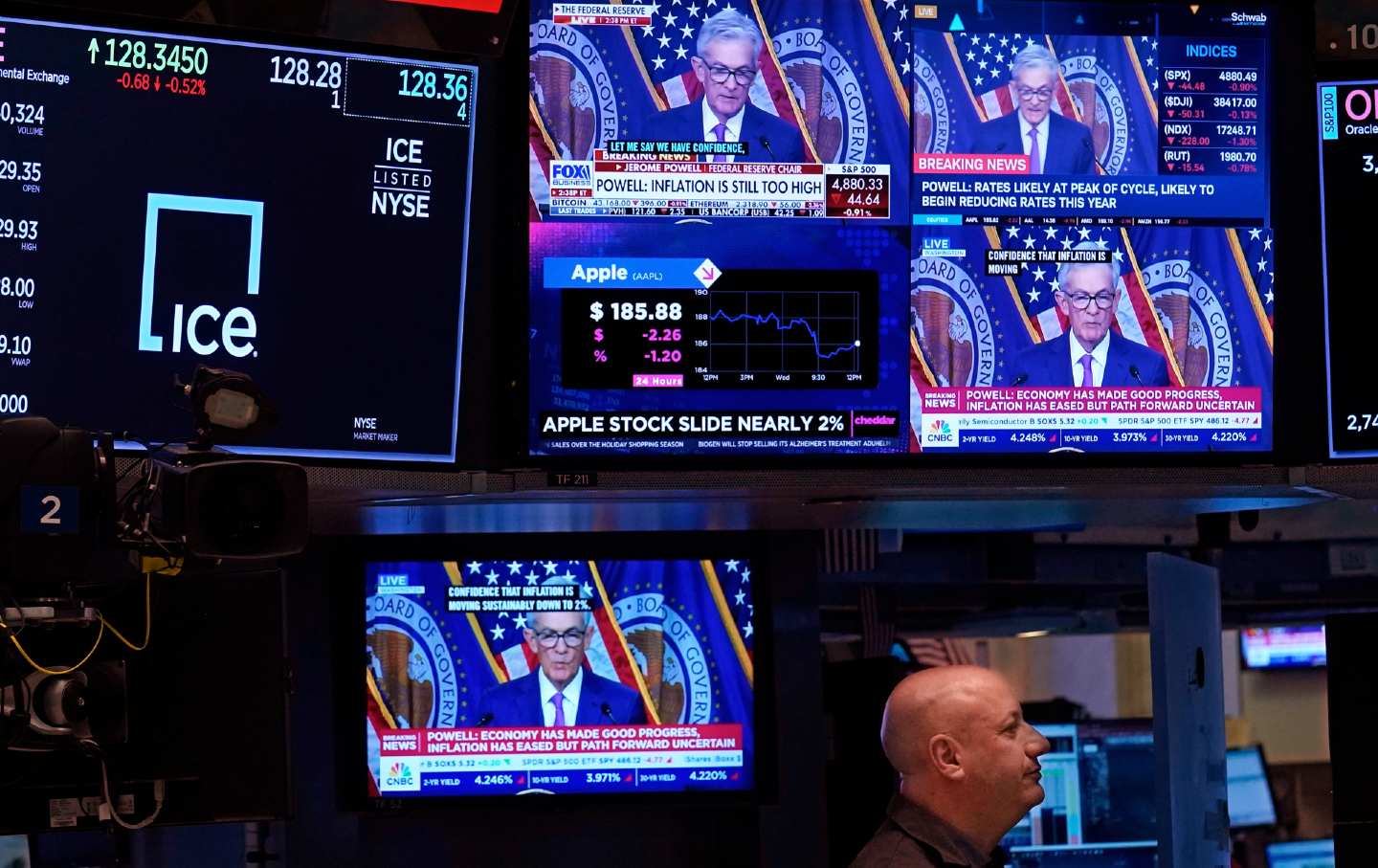
Do People Think the Economy Is Bad Because the Media Failed, or Because the Economy Is Actually Bad? Do People Think the Economy Is Bad Because the Media Failed, or Because the Economy Is Actually Bad?
Two experts look at the data come to very different conclusions about the state of the US economy.
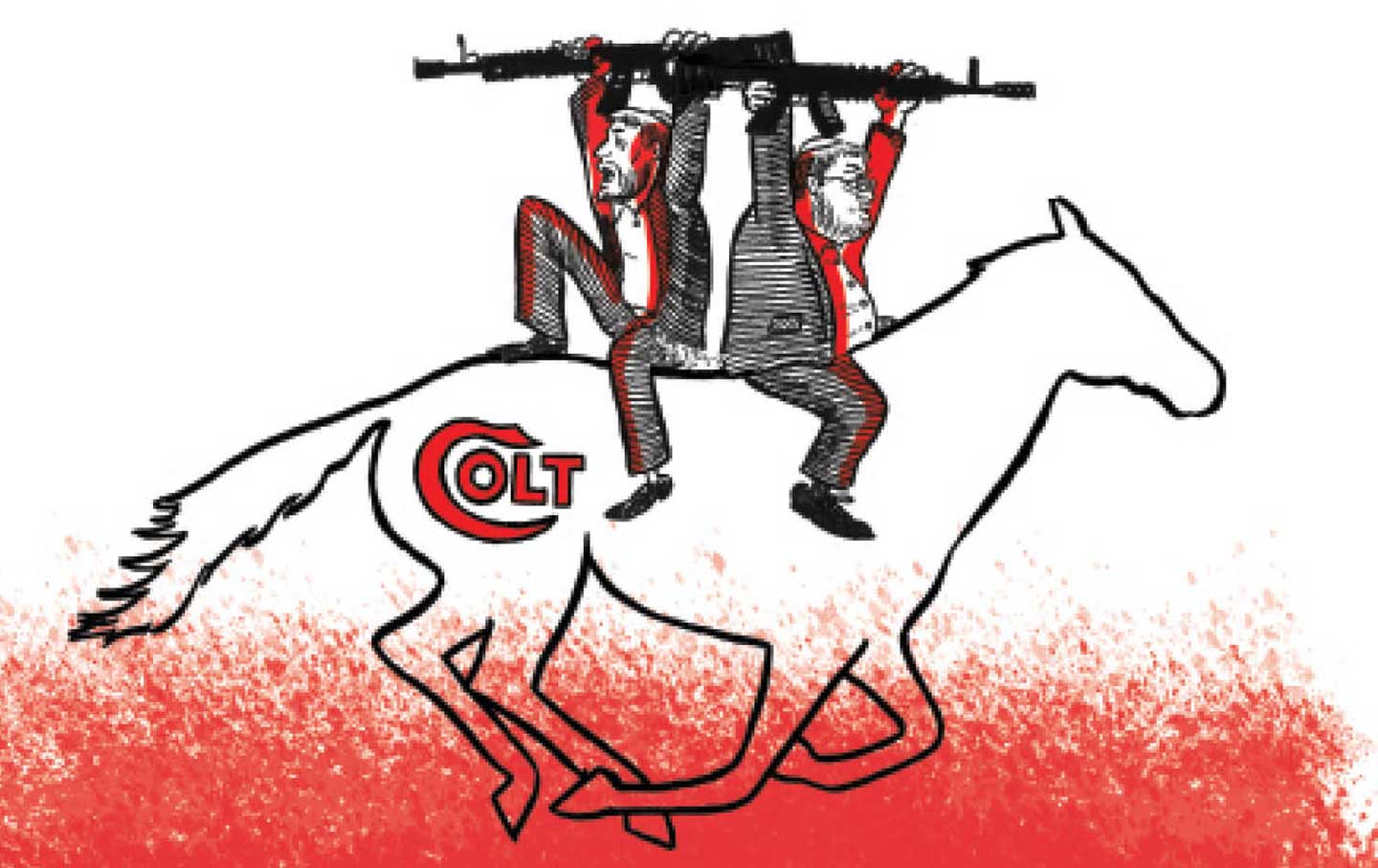
These Corporations Are the True “Winners” of the War on Gaza These Corporations Are the True “Winners” of the War on Gaza
From Colt to Caterpillar, American companies are earning big profits off of Israel’s ongoing assault on Gaza, turning the horrors of war into boardroom victories.
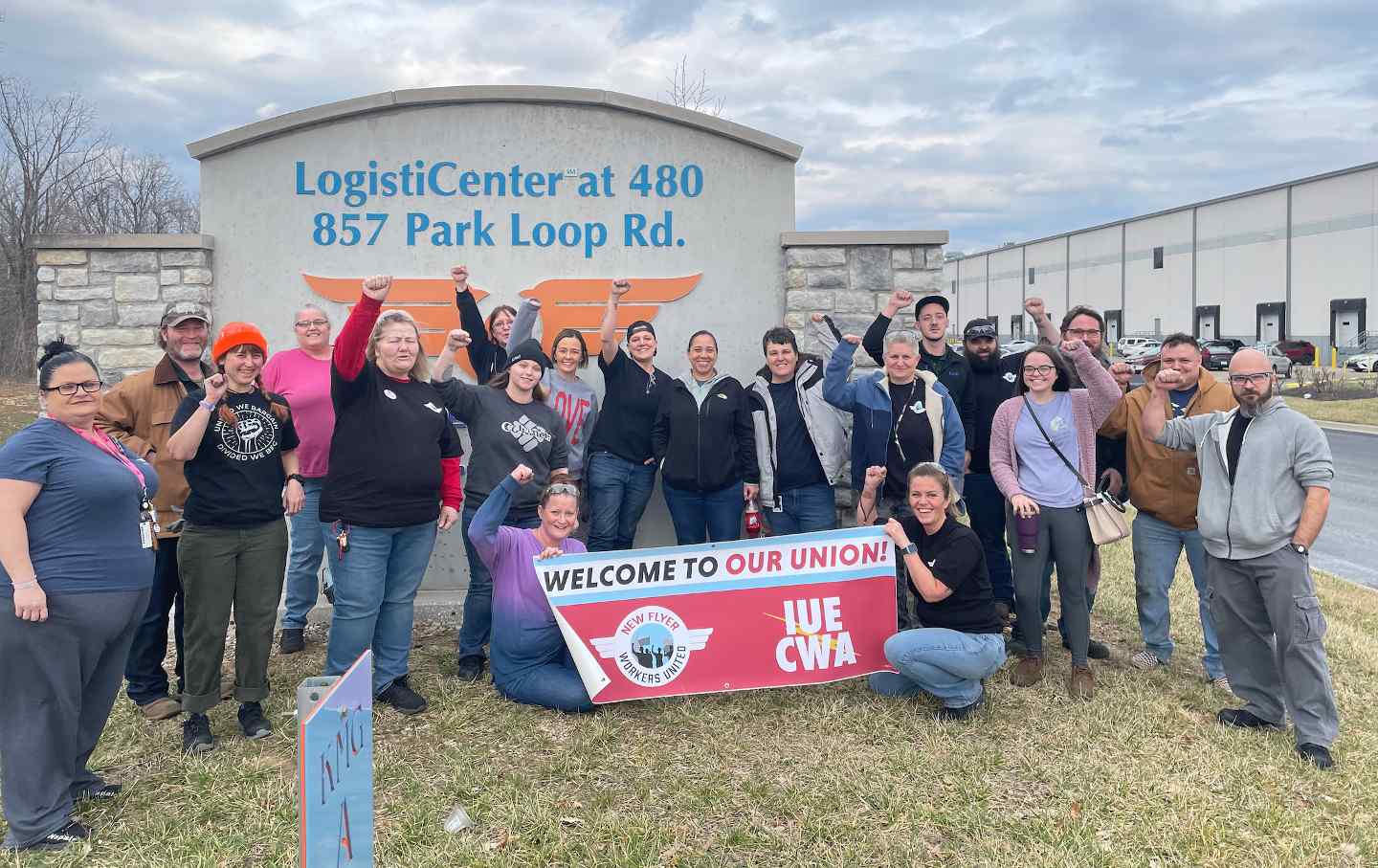
The Win for EV Workers in the South You Didn’t Hear About The Win for EV Workers in the South You Didn’t Hear About
Could the union victory at an electric bus manufacturing plant in Alabama turn the South into a hub for quality jobs in the green economy?
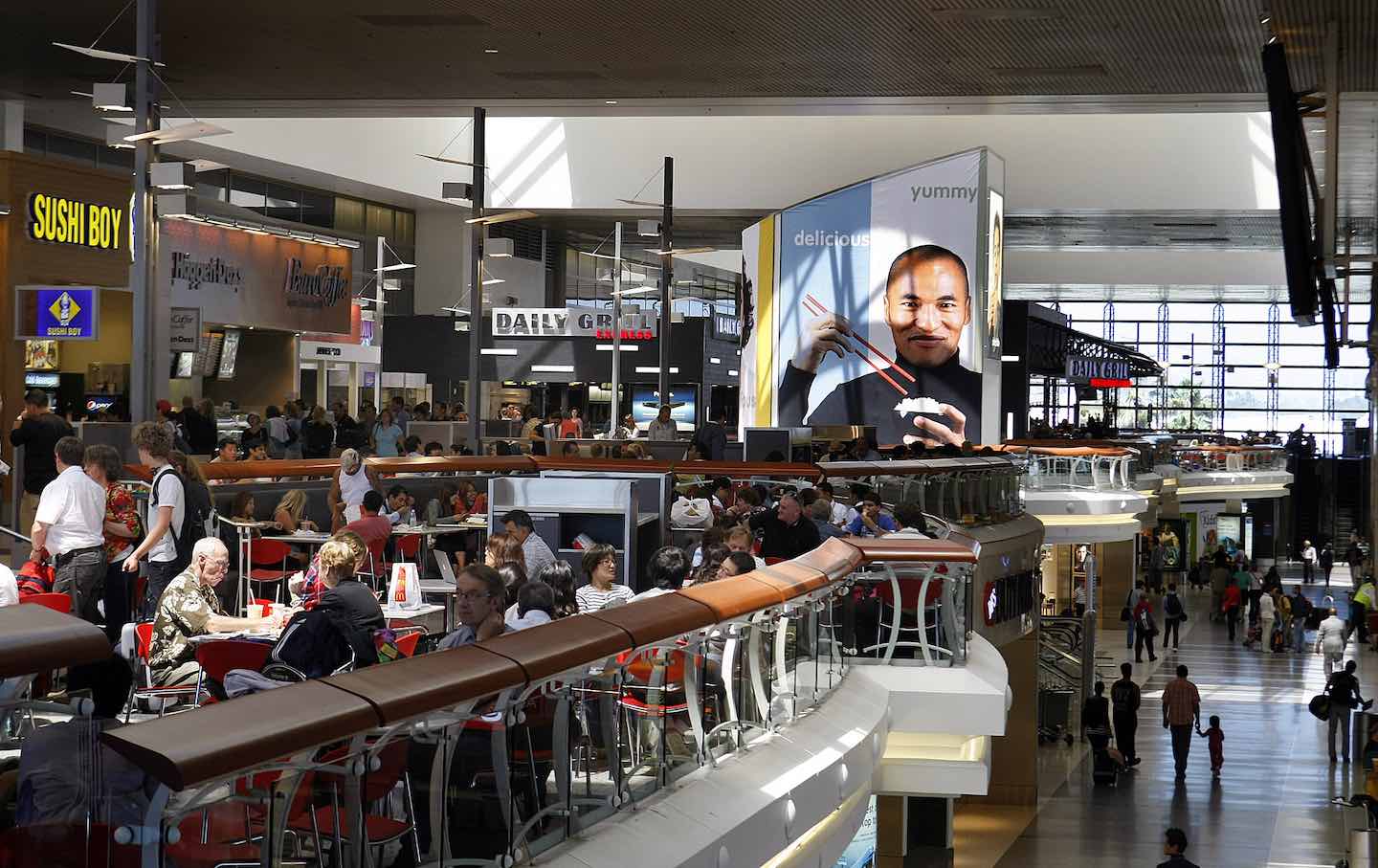
The World’s Biggest Pension Fund Is Taking a Hard Look at Labor Practices The World’s Biggest Pension Fund Is Taking a Hard Look at Labor Practices
“There are lines that cannot be crossed,” said a member of the board of California’s Public Employees Retirement System.
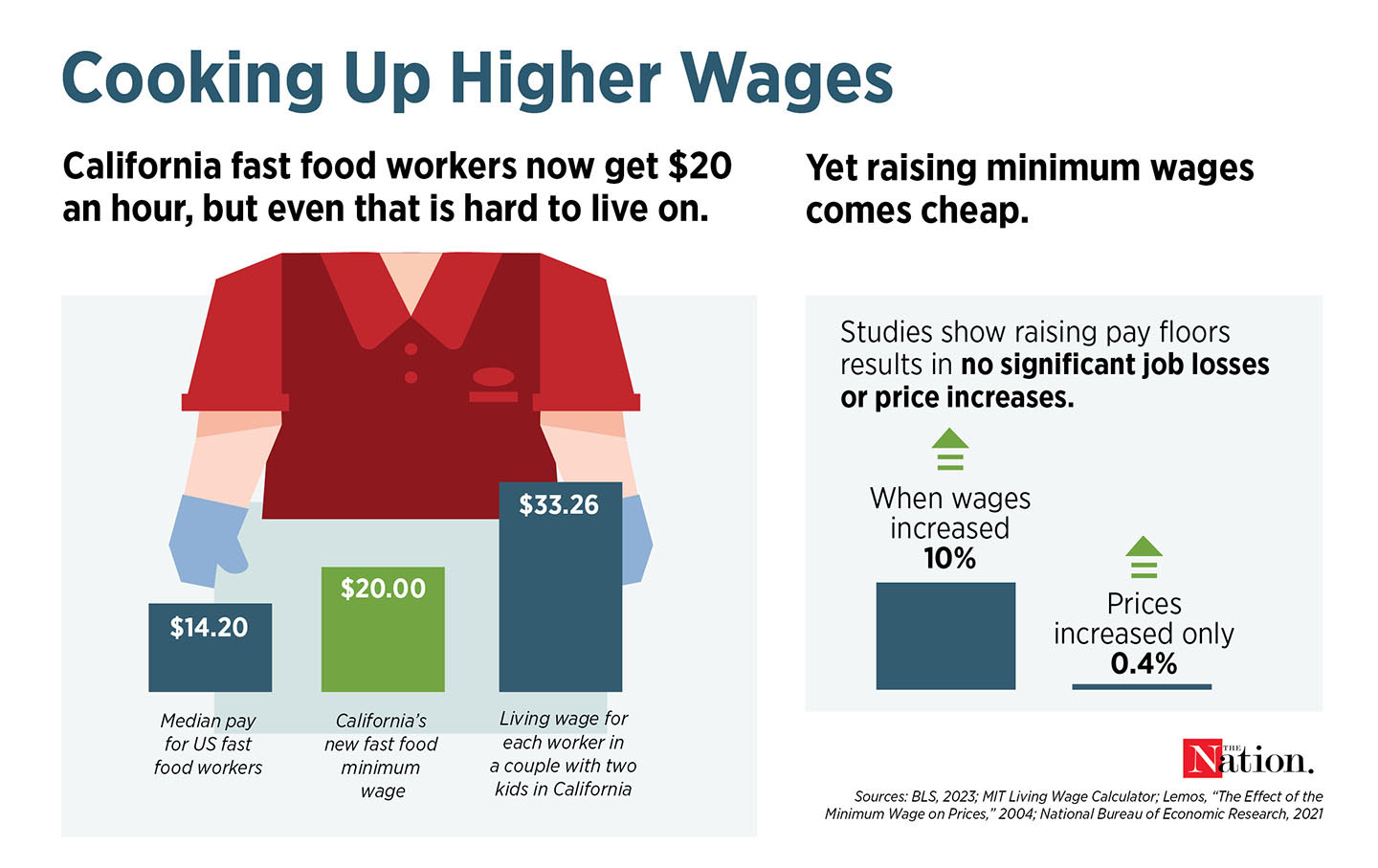
Raising the Minimum Wage Comes Cheap Raising the Minimum Wage Comes Cheap
Studies overwhelmingly show that the effect of increasing the minimum wage on employment rates is basically zero.
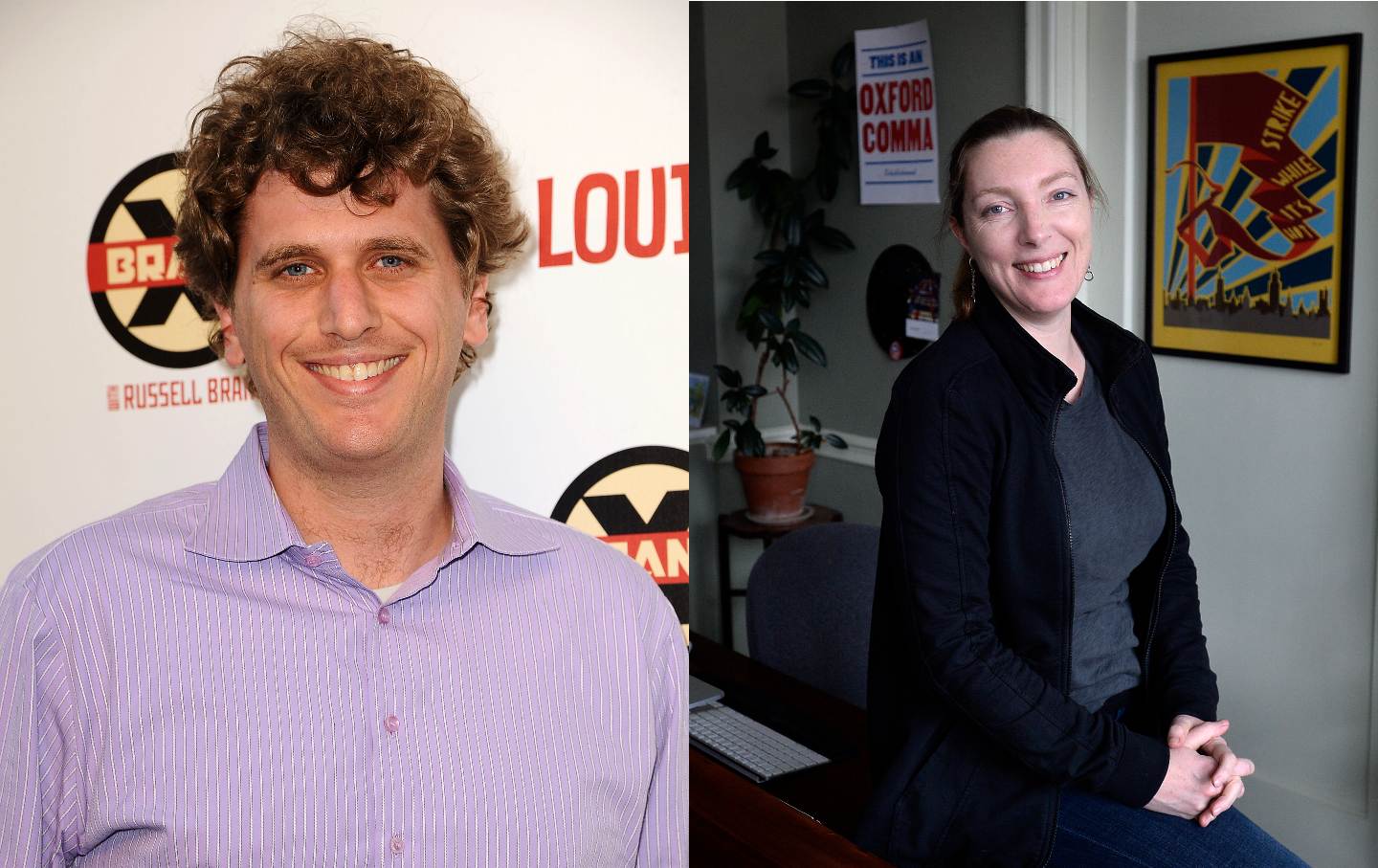
Is 2024 the Year of Trust-Busting? Is 2024 the Year of Trust-Busting?
Matt Stoller and Stacy Mitchell discuss the battle against monopoly power.


